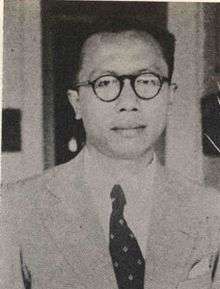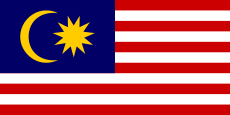Djuanda Kartawidjaja
Djuanda Kartawidjaja (EYD: Juanda Kartawijaya; 14 January 1911 – 7 November 1963) was an ethnic Sundanese noble from the court of Cirebon, an Indonesian politician and the 11th and the final Prime Minister of Indonesia. Raden Djuanda Kartawidjaja, usually referred to simply as Djuanda, served as Minister of Communications in seven cabinets from 1946 to 1949 and 1950 to 1953; as Minister of State in 1949 and Minister of Welfare from 1949 to 1950. Djuanda was Indonesia's final Prime Minister in Sukarno "Karya" cabinets, the final cabinets of the Liberal Democracy Era (prior to the Guided Democracy period) and as First Minister from 1959 until his death in 1963.
Djuanda Kartawidjaja | |
|---|---|
 | |
| 10th Prime Minister of Indonesia | |
| In office 9 April 1957 – 9 July 1959 | |
| President | Sukarno |
| Preceded by | Ali Sastroamidjojo |
| Succeeded by | Sukarno |
| 11th Minister of Finance of Indonesia | |
| In office 10 July 1959 – 6 March 1962 | |
| President | Sukarno |
| Preceded by | Sutikno Slamet |
| Succeeded by | R. M. Notohamiprodjo |
| 11th Minister of Defence of Indonesia | |
| In office 9 April 1957 – 9 July 1959 | |
| President | Sukarno |
| Preceded by | Ali Sastroamidjojo |
| Succeeded by | Abdul Haris Nasution |
| 5th Minister of Public Works of Indonesia | |
| In office 29 January 1948 – 4 August 1949 | |
| President | Sukarno |
| Preceded by | Herling Laoh |
| Succeeded by | Herling Laoh |
| 3rd Minister of Transportation of Indonesia | |
| In office 6 September 1950 – 30 July 1953 | |
| President | Sukarno |
| Preceded by | Mananti Sitompul |
| Succeeded by | Abikoesno Tjokrosoejoso |
| In office 2 October 1946 – 4 August 1949 | |
| President | Sukarno |
| Preceded by | Endun Abdul Karim |
| Succeeded by | Herling Laoh |
| Personal details | |
| Born | 14 January 1911 Tasikmalaya, Dutch East Indies |
| Died | 7 November 1963 (aged 52) Jakarta, Indonesia |
| Cause of death | Heart Attack |
| Nationality | Indonesia |
| Profession | Technocrat |
Djuanda's death and the abolition of the post of Prime Minister in the Indonesian Republican system allowed far greater power to be exercised by the President- now being given full ruling power with minimal oversight, as both Head of State and Head of Government. This had an enormous impact on Indonesian politics, allowing the constitutional legality of the autocracy of Sukarno and Suharto.

Juanda International Airport, located in Surabaya, is named after him, who suggested development for the airport. He is also depicted in the recent 2016 edition of Rp 50,000 Indonesian rupiah banknotes.[1]
Honour
Foreign honour

References
- Ricklefs (1982), A History of Modern Indonesia, Macmillan Southeast Asian reprint, ISBN 0-333-24380-3
- Simanjuntak, P.H.H (2003) Kabinet-Kabinet Republik Indonesia: Dari Awal Kemerdekaan Sampai Reformasi (Cabinets of the Republic of Indonesia: From the Start of Independence to the Reform Era), Penerbit Djambatan, Jakarta, ISBN 979-428-499-8
- Angga Aliya ZRF (19 December 2016). "Rupiah Desain Baru Terbit Hari Ini". detikfinance. Retrieved 26 January 2017.
- "Senarai Penuh Penerima Darjah Kebesaran, Bintang dan Pingat Persekutuan Tahun 1959" (PDF).
